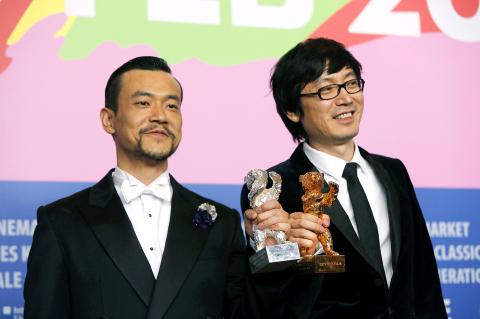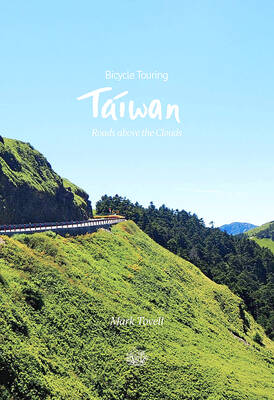The 64th Berlin film festival wrapped up Sunday after a resounding triumph for Asian cinema at its gala awards ceremony, including the Golden Bear top prize for a Chinese noir mystery.
Bai Ri Yan Huo (白日焰火, Black Coal, Thin Ice), by Diao Yinan (刁亦男) about a washed-up ex-cop investigating a series of grisly murders took the highest honor late Saturday, as well as the Silver Bear best actor award for its star Liao Fan (廖凡).
“It’s really hard to believe that this dream has come true,” Diao said as he accepted the trophy, fighting back tears.

Photo: AFP
It was the first Chinese film to win in Berlin since the unconventional love story Tuya De Hunshi (圖雅的婚事, Tuya’s Marriage) by Wang Quan’an (王全安) brought home the gold in 2007.
In a remarkably strong showing for Asian contenders, the Berlinale, Europe’s first major film festival of the year, gave its best actress prize to Japan’s Haru Kuroki for her role as a discreet housemaid in wartime Tokyo in Yoji Yamada’s The Little House.
Yamada, 82, called the film a necessary reminder of war’s horrors for contemporary Japan.
German media reported widespread disappointment that the hot favorite to win the Golden Bear, US filmmaker Richard Linklater for his ambitious coming-of-age tale Boyhood, made over 12 years with the same actors, only claimed best director. But most called the prize for Black Coal, Thin Ice justified in a competition with few real standouts.
“Bai Ri Yan Huo is a brilliant genre variation which knows how to self-confidently update its Western prototypes and put them in new contexts,” news Web site Spiegel Online said.
Berlin’s daily Der Tagesspiegel called the choice “respectable.”
The film “is a bloody genre piece, a social portrait of the Chinese backwoods and a passionate drama all in one,” it said.
“And it represents Chinese cinema, growing in aesthetic strength that is successfully charting a new path between small films made below the censors’ radar and the bombastic hero epics in a booming domestic market.”
ENTHUSIASM FOR CHINESE CINEMA
The second of three Chinese films in competition in Berlin, Blind Massage (推拿) featuring a cast made up in part of amateur blind actors, captured a Silver Bear prize for outstanding artistic contribution for cinematographer Zeng Jian (曾劍).
Best screenplay went to the German siblings Dietrich and Anna Brueggemann for their wrenching drama Stations of the Cross about a teenager who makes the ultimate sacrifice for her fundamentalist Catholic family.
A nine-member jury led by US producer James Schamus (Crouching Tiger, Hidden Dragon) handed out the prizes at a theatre in the German capital.
Black Coal, Thin Ice is set in the late 1990s in the frosty reaches of northern China and its murder mystery plot is told through enigmatic flashbacks. Liao said he put on 20kg to play the alcoholic suspended police officer who falls hard for a beautiful murder suspect, played by Taiwanese actress Gwei Lun-mei (桂綸鎂).
Diao said his film, his third feature, bridged the gap between pure arthouse cinema and multiplex fare.
“I finally did find the right way to combine a film which has a commercial aspect to it but which is nonetheless art, so that it’s possible to launch it in these terms,” he told reporters after the awards ceremony.
Diao said Chinese films were gaining ground in Western cinemas thanks in part to their exposure at major festivals.
“Every time we take our films abroad it seems that there is an ever greater enthusiasm for Chinese cinema,” he said.
WHITEST OF WHALES
The film has yet to be released in China but a state media report said it had received a government permit for screening with release possible in April or May.
However some Chinese cinemagoers questioned whether political sensitivity might block its release at home, or at least result in deep cuts. China censors films it deems obscene or politically touchy.
“The sensitivity of the theme and content of the film is high, so I don’t know whether it can be shown in China,” said a microblog posting under the name Jiade Changle.
US movie news Web site Indiewire noted that buzz about the picture had been strong before its screening “on the possibility of the film becoming that whitest of whales: a crossover Chinese-language international hit.”

In late October of 1873 the government of Japan decided against sending a military expedition to Korea to force that nation to open trade relations. Across the government supporters of the expedition resigned immediately. The spectacle of revolt by disaffected samurai began to loom over Japanese politics. In January of 1874 disaffected samurai attacked a senior minister in Tokyo. A month later, a group of pro-Korea expedition and anti-foreign elements from Saga prefecture in Kyushu revolted, driven in part by high food prices stemming from poor harvests. Their leader, according to Edward Drea’s classic Japan’s Imperial Army, was a samurai

The following three paragraphs are just some of what the local Chinese-language press is reporting on breathlessly and following every twist and turn with the eagerness of a soap opera fan. For many English-language readers, it probably comes across as incomprehensibly opaque, so bear with me briefly dear reader: To the surprise of many, former pop singer and Democratic Progressive Party (DPP) ex-lawmaker Yu Tien (余天) of the Taiwan Normal Country Promotion Association (TNCPA) at the last minute dropped out of the running for committee chair of the DPP’s New Taipei City chapter, paving the way for DPP legislator Su

It’s hard to know where to begin with Mark Tovell’s Taiwan: Roads Above the Clouds. Having published a travelogue myself, as well as having contributed to several guidebooks, at first glance Tovell’s book appears to inhabit a middle ground — the kind of hard-to-sell nowheresville publishers detest. Leaf through the pages and you’ll find them suffuse with the purple prose best associated with travel literature: “When the sun is low on a warm, clear morning, and with the heat already rising, we stand at the riverside bike path leading south from Sanxia’s old cobble streets.” Hardly the stuff of your

Located down a sideroad in old Wanhua District (萬華區), Waley Art (水谷藝術) has an established reputation for curating some of the more provocative indie art exhibitions in Taipei. And this month is no exception. Beyond the innocuous facade of a shophouse, the full three stories of the gallery space (including the basement) have been taken over by photographs, installation videos and abstract images courtesy of two creatives who hail from the opposite ends of the earth, Taiwan’s Hsu Yi-ting (許懿婷) and Germany’s Benjamin Janzen. “In 2019, I had an art residency in Europe,” Hsu says. “I met Benjamin in the lobby